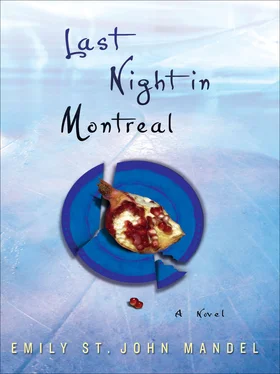He followed her quietly over the mountains, tracing lines on maps of the North American continent, making phone calls, talking to far-off police departments, picking up sightings, rumors, tips. He followed her out of his life and into a hinterland composed of folders and documents, each holding the keys to her missing life, his path through the wilderness marked by coffee rings. He worked late into the night. There were over a hundred pages of documents relating to the case: photographs, police reports, possible sightings. Memory reduced to manila envelopes and typed documents, stills from surveillance videos, early-childhood photographs. There was one photograph in particular that haunted him: it was used by the Quebec press shortly after her disappearance and depicted two unsmiling dark-haired children, Lilia and her half-brother Simon, in front of their beaming mother on the steps of a distant porch. The small boy has his arm around his tiny sister. The two children gaze seriously at the camera, their mother radiant behind them. What drives a seven-year-old to run out barefoot into snow? The question troubled him.
Still, Lilia wasn’t far away from him; as the months passed he felt at times that he was getting close. There were strange moments like flashes of light, when he looked at the map and thought he knew where she was. He brought the folders home in the evenings and spread documents over the dining room table. From there he followed the missing girl over the desert, like something winged and distant in the blazing sky; the car curved around the highway, just out of sight, while he stared at a map in his dining room in Montreal. Michaela watched his departure from the stairs.
He glanced at his daughter across the dining room table sometimes, on the increasingly rare nights when they all sat down for dinner together, and silently wondered if he would be able to explain this to her later on, in some unimaginably pleasant future when they could sit down for a drink together, reconciled in Michaela’s adulthood: I wasn’t avoiding you, it wasn’t your fault, but there was a cufflink and a tie and she wasn’t speaking to me, and my marriage. . The explanation fell apart even in his mind. (Notes on the second law of thermodynamics: All systems tend inevitably toward entropy. Why should my family be any exception? )
When Lilia was very young the entire world seemed composed of motel rooms, strung like an archipelago across the continental United States. Island life was fast and transient, all cars and motel rooms and roadside diners, trading used cars at sketchy lots on the edges of places, long rides down highways in the sunlight, in the rain, talking to waitresses who thought she was too young for coffee, nights spent under the scratchy sheets of cheap roadside motels, messages written secretly in motel-room Bibles. I don’t want to be found.
There were hours spent in quiet libraries. Her father brought her history books, books about science, books about people he thought she should be aware of, then sat nearby reading the paper while she worked her way through the stack. He tested her on comprehension back in the motel room in the evening. There were sometimes questions: “Isn’t it a school day?” a librarian or a bookstore clerk would ask.
Her father had coached her in the appropriate response: “I’m homeschooled,” Lilia said. If this seemed insufficient, she added, “for religious reasons.” She liked books, but the hours spent in small-town libraries were tedious, and she began the first list when she was eight or nine as a means of distraction. A list of names, eventually expanding to ten or twelve pages: Lilia, Gabriel, Anna, Michelle. In every town her name was different; there were often, especially in the beginning, several names and stories in the course of any given month. At first Lilia and her father concocted the stories carefully together and practiced them on the way into town. Later they could play off each other without rehearsal— “Elizabeth,” he’d call out, in the magazine section of a gas station store (those bright new stores, too large for the smallness of the town outside, with rows of shiny packaging and a strange stale smell like dead coffee and mildew), “Elizabeth, it’s time to go—” and although she wouldn’t ever have been called that name before, she’d recognize his voice and turn around and smile just like a real Elizabeth would, and then note the new name on the list in a library later. It wasn’t an unhappy life. She liked traveling.
But the sense of being chased overtook him without warning. It always registered first as a tension in his hands on the steering wheel; he would start tapping out a rhythm on the wheel with his thumb and two fingers, a beating three-four rhythm, fast ruinous waltz. Sometimes he glanced in the rearview mirror and thought he saw something, or saw nothing but was frightened anyway, and he motioned silently toward the backseat. She would climb between the front seats and slip into the back of the car, frightened into smallness, and hide in a private improvised tent.
In the first year her father used to pull the car over and hide her, but later she knew how to build her own shelter, and she’d perfected her hiding place by the time she turned eight; she knew how to build a tent with blankets and pillows and suitcases in the backseat of a car, a way of disappearing into the chaos of luggage and pillows and blankets and coats. She hid there by the hour in the shifting darkness until her clothes clung to her body with sweat. She was suspicious of the dark, so her father gave her a flashlight, and she liked to shine it in circles on the blanket ceiling, practicing a new kind of cursive writing, drawn in light, and the car moved beneath her like a ship. She was a stowaway crossing hazardous seas. A fugitive, always. When she was small she imagined that her tent was dug deep into snow far up in the arctic, or half buried in a sandstorm in a hot treacherous land. She imagined there were search parties out looking for her: Bedouin nomads, explorers on sleighs drawn by teams of huskies, sailors going through the crates and spools of rope in the depths of the ship — but in her happiest daydreams they passed her by. She was never unearthed from the snowdrift, the nomads never found her in the sand dunes, she was never pulled flailing up out of the hold. She lay still by the hour, lost and undiscovered, and she sometimes imagined Simon lying there beside her, although the details of his face were fading and she wasn’t sure she remembered what he looked like anymore, and the beam of her flashlight traced patterns on the blanket overhead. The light circling like a signal in her limited sky.
When Michaela was eleven and twelve and thirteen she liked movies about cat burglars and had ideas about dynamite. It wasn’t so much a yearning to blow up anything specific; it was something more like an idea that she could probably figure out how to make things explode if she had to. She had similar suspicions about scaling the walls of bank towers and walking on tightropes across streets, but her feelings about tightropes were much more definite, or at the very least better-informed: partly on the theory that talent skips generations and partly to appease two irate sets of grandparents, it had been decided very early on to send Michaela to circus school. Three days a week after school she took a bus to a neighborhood near McGill University, arriving early if at all possible. The circus school, a dusty venture run out of a vaulted church basement by double-jointed Moscow Circus veterans, was equipped with a rudimentary high wire, and she spent as much time as possible walking back and forth.
Читать дальше












